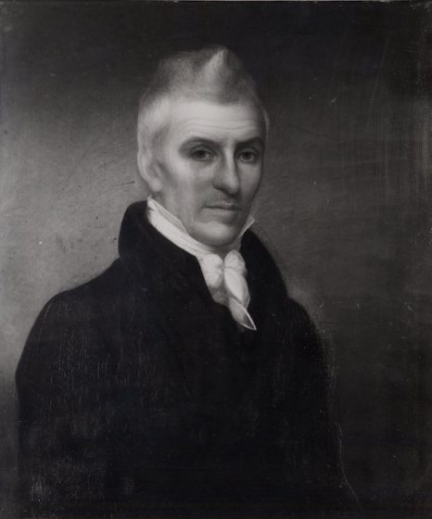Henry Davis

Back to Middlebury History Online
Rev. Henry Davis (1771-1852) was born at East Hampton, New York, in 1771. He prepared for college at Clinton Academy and graduated at Yale in 1796. In 1806 he was called to the Professorship of Greek in Union College; three years later upon the retirement of Dr. Atwater he was elected President of Middlebury College, and was ordained at the time of his inauguration, which took place in February, 1810.
The increased number of students now in attendance necessitated more extensive accommodations and it was resolved at a meeting of the corporation in October, 1810, “to erect a new college edifice on the ground lately conveyed to the President and Fellows of Middlebury College by Col. Seth Storrs,” this land comprising a little more than thirty acres beautifully situated in an elevated part of the village, still continues to form the college campus. It was likewise resolved to ask the legislature for assistance. Accordingly a petition was presented exhibiting a concise history of the college, its condition and its wants. The petition was respectfully received and referred to a committee. This committee reported that the institution deserved the attention and consideration of the legislature but unfortunately they could devise no means by which the relief could be afforded. This instance is a history of all the various applications for aid from the state; there seemed to be little of that spirit which in 1785 prompted them to make the large grant to Dartmouth College. Middlebury was never given any of the college lands, and the only sum obtained from the state up to 1888 was $1400, given in 1852, and this notwithstanding the fact that for many years Middlebury was the larger college in the state. But the interest of private individuals was more substantial. Already $8000 had been subscribed by citizens toward the erection of the new building, and in 1815 it was completed under the superintendence of Judge [Gamaliel] Painter, and named after him. Dr. [Timothy] Dwight did not lose his interest in the new institution whose establishment he had urged so strenuously. Twice did the worthy President of Yale visit Middlebury after the college had been started, once in 1806 and once in 1810. A year after his last visit he wrote: “It has continued to prosper though its funds have been derived from private donations, and chiefly if not wholly from the inhabitants of the town. When it is remembered that twenty-five years ago the spot now occupied by the College was a wilderness, it must be admitted that these efforts have done the authors of them the highest honor. The number of students is now one hundred and ten—probably as virtuous a collection of youths as can be found in any other seminary in the world.”
In 1813 Gen. Arad Hunt of Hinsdale, New Hampshire, deeded to the College lands in Albany, Vermont amounting to more than five thousand acres, though a clear title was not gained till after much litigation. The first considerable effort to raise funds was undertaken by President Davis in the fall of 1815. He addressed a meeting of the citizens in a most eloquent and persuasive speech, and before the people had dispersed, over $20,000 had been subscribed in good faith, though some of the subscribers were hardly worth the amount of their subscription. He met with such good success in other towns that by the following spring over $50,000 had been pledged. But owing to a change of times for the worse, and a misunderstanding which unfortunately grew up, only about $14,000 was ever paid.
Dr. Davis was a popular President. His classes increased in size from twenty-six in 1812 to thirty in 1815. On the death of Dr. Dwight he was elected President of Yale University but declined the office. In 1817 he was offered the Presidency of Hamilton College and resigned his position at Middlebury to accept it. A few years later he also resigned that position but continued his residence there until his death in 1852.

